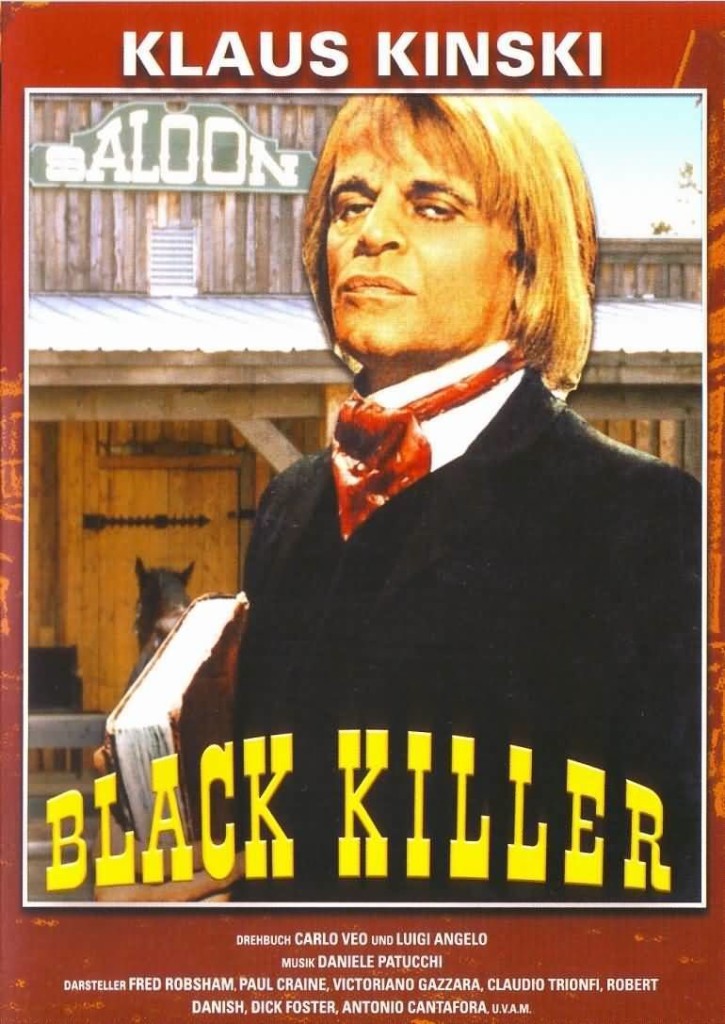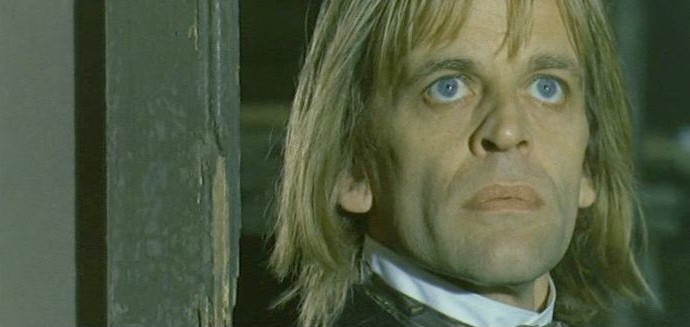Dir: Carlo Croccolo
Star: Fred Robsahm, Antonio Cantafora, Klaus Kinski, Marina Malfatti
This is one of Kinski’s more morally-ambiguous characters. Sure, gun-toting lawyer James Webb is clearly a man with no qualms about manipulating others to achieve his own ends, nor is he squeamish about violence, dealing death from his law books, in which he has concealed pistols. However, as far as the town of Tombstone – hey, local flavor, even if this never leaves Italy! – is concerned, he represents a much more palatable alternative than the O’Hara clan, who are responsible for a reign of terror in the area. Contrary to what their name might suggest, they are not Irish, but apparently Mexican – the first names of the five brother who make up the gang are Ramon, Pedro, Miguel, Ryan (!) and Slide (???). They have a scheme by which they force, with intimidation and brutality, small landowners to hand over the deeds to their property, working in cahoots with Judge Wilson, the local arm of the judiciary. The town sheriff is no use: they’ve already gone through eight of those, and the ninth is terminated after daring merely to issue a wanted poster for one of the brothers, Pedro.
When Webb arrives, toting his books somewhat ostentatiously, there are thoughts he might be a long-awaited federal agent. That isn’t the case – as we discover, when the real one is ambushed by the O’Haras and killed, before he even reached Tombstone. But Webb certainly has an agenda, and sets his plan in motion. Meanwhile, Burt Collins (Robsahm) arrives in town to visit his brother, Peter, one of the victims of the O’Haras, who now lives on the outskirts of his town with his squaw wife, Sarah (Malfatti). Yes, I know the term “squaw” is considered derogatory these days, but you should see this portrayal, which is pretty much a collection of stereotypes, all fringed buckskin, beaded hair and good with a bow and arrow, played by an actress born in Florence, without any apparent ounce of native American blood. Burt kills two of O’Hara’s men after catching them cheating at cards in the town saloon, which is run by the semi-respectable brother, Ramon (Cantafora). The following day, when three more members of the gang show up, seeking revenge, and are shot (with a little help from Webb), Burt is told by Judge Wilson (also with a little help from Webb), he must become sheriff #10, or stand trial. If he kills all the O’Haras, the land will default to Wilson, who offers to split it 50/50 with Burt.
 Before he can get that far, the O’Haras strike first, attacking Burt when he is visiting Peter and Sarah. The new sheriff is beaten unconscious, Sarah raped, and her husband killed when he tries to stop the attack. The gang set the farm on fire, but fail to finish off the Sarah and Burt, which turns out to be a fatal mistake, for the second half of the film (largely free of Kinski), concentrate instead on Burt and Sarah’s team-up against the O’Haras. no longer solely driven by Judge Wilson’s interests. [If ever I become an evil overlord, I will instruct my minions to be utterly ruthless, and leave no survivors who can take on a mission of personal vengeance…] Between Burt’s shooting, and Sarah’s archery skills, the gang of brothers are whittled down until only Ramon is left. Webb, meanwhile, turns out to have some nifty safe-cracking skills, and uses these to extract papers from Wilson’s safe, applying the screws to the judge and setting up the final confrontations between the various corners of the plot, in and around the center of Tombstone.
Before he can get that far, the O’Haras strike first, attacking Burt when he is visiting Peter and Sarah. The new sheriff is beaten unconscious, Sarah raped, and her husband killed when he tries to stop the attack. The gang set the farm on fire, but fail to finish off the Sarah and Burt, which turns out to be a fatal mistake, for the second half of the film (largely free of Kinski), concentrate instead on Burt and Sarah’s team-up against the O’Haras. no longer solely driven by Judge Wilson’s interests. [If ever I become an evil overlord, I will instruct my minions to be utterly ruthless, and leave no survivors who can take on a mission of personal vengeance…] Between Burt’s shooting, and Sarah’s archery skills, the gang of brothers are whittled down until only Ramon is left. Webb, meanwhile, turns out to have some nifty safe-cracking skills, and uses these to extract papers from Wilson’s safe, applying the screws to the judge and setting up the final confrontations between the various corners of the plot, in and around the center of Tombstone.
I’ve really got no idea what the title means in the context of the film, or even to whom it is supposed to refer; it could be just about any of the characters, from the Judge, through the two protagonists, to Ramon O’Hara. But it’s hard to be sure, since nobody in the film is black, and nobody in the films kills anyone who is black either. Otherwise, much of this is fairly standard Western fare, the main exception being the question of whether Webb and Collins have a relationship, or if their near-simultaneous arrival in the town is merely fortuitous. They share very few scenes in the film, up until the climax, and it seems the script intentionally keeps it murky as to who is running things. My money is on Webb being the puppet-master, not least because he is smart enough not to step directly into the firing line against the O’Haras. He apparently prefers to spend his time lurking around the saloon, which is equipped with an unexpected number of curtains, perfect for skulking behind to overhear conversations, etc.
The ending kinda clarifies things, though can hardly be said to tie up all the loose ends, with the question of the Collins/Webb relationship never fully explained. Still, it’s solid enough, even if I wished Kinski had been quite as prominent in the film as he is on the promotional materials, and Daniele Patucchi’s score cements his place among the upper tier of Italian soundtrack composers. Have to say, the English dubbing here is also quite interesting, giving Webb a plummy, upper-class sound that is certainly unusual and distinctive, particularly when whoever is playing the part gets to sink their teeth into lines like “It seems to be oozing with quiet calm,” as Webb sarcastically describes Tombstone to Ramon on arriving in the town. Webb certainly puts the “aggressive” in “aggressive legal representation,” even if you do wonder how he manages to aim his lethal library with such apparent accuracy.
